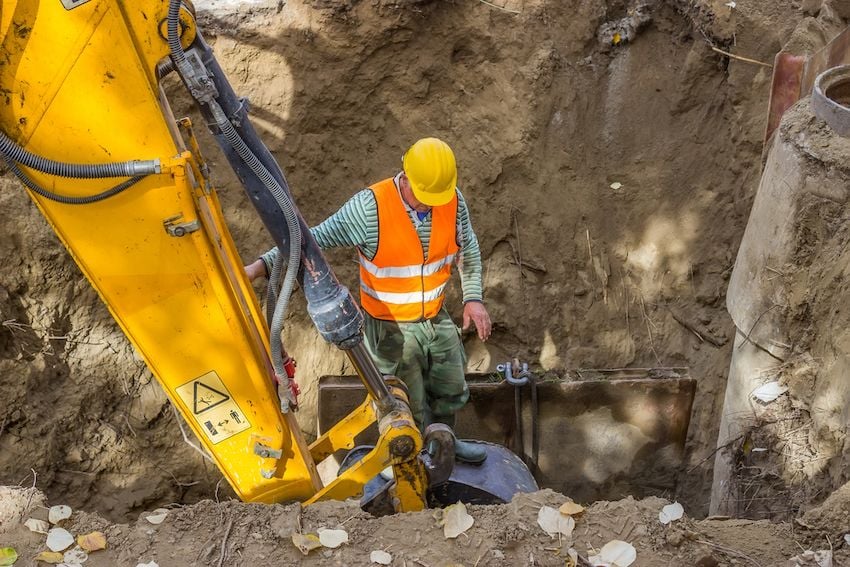A One Call ticket management system is a type of damage prevention software used by natural gas, cable TV, electric, telecommunications, and water and sewer companies for managing 811 tickets. Also known as an 811 ticket management system, One Call ticket management systems integrate with software used by one call centers to manage tickets that homeowners and professional contractors submit before digging.
Administrators use One Call ticket management systems to review and assign 811 tickets to in-house or third-party locators, who will mark the specified area with the appropriate markings within the specified time frame. Locators and other field workers use ticket management systems to update and close tickets when the work is done.
Although some telecommunications companies already use ticket management systems, not all do. In this blog, we explain why implementing a ticket management system should be a top priority for telecom asset protection, fiber security, or similar teams. We also share a few features telecoms should look for when evaluating One Call ticket management software options.
Why telecoms need a One Call ticket management system
Damages to underground telecommunications facilities have, unfortunately, become increasingly common. In 2020, 235,000 underground telecom and cable TV facilities were damaged, according to the Common Ground Alliance’s 2020 DIRT Report. That number represents nearly 65 percent of damages to all critical underground infrastructure and is a 6 percent increase in the proportion of damages since 2019.
Locator error plays a big role in damages. Again according to the 2020 DIRT Report, more than 12 percent of all damages in 2020 were due to a facility not being marked due to locator error or a facility marked inaccurately due to locator error. By implementing an 811 ticket management system, telecoms get greater insight as to where locators are making mistakes.
Additionally, telecoms can use a ticket management system to determine whether it’s necessary to even dispatch locators in the first place. By viewing incoming 811 tickets before sending them to locating contractor partners, telecoms can eliminate tickets where they know they do not have facilities or where the threat or impact of damages is very low.
With telecoms spending billions of dollars on wireless initiatives, it’s essential they find a way to better track and reduce damages to existing and new infrastructure. One Call ticket management software is one tool that can help.
Reduce Outages Now: How Telecom and Cable Leaders are Preventing Fiber Damage
What to look for in a One Call ticket management system
There are a number of 811 ticket management solutions in the market. Although comparison shopping isn’t something most people enjoy, it’s important that telecom companies evaluate different ticket management system features to ensure they get the best solution to protect underground facilities from third-party damages.
To that end, here’s what to look for in a One Call ticket management system.
1. Integration with One Call Centers
The system should be able to receive tickets in close to real-time from One Call centers in your coverage areas via Web Service, sFTP, or other supported mechanisms. Furthermore, the ticket management system must be able to transmit updates back to the One Call centers. This includes positive response information as well as notes and attachments, like site photographs.
Read: 4 Things One Call Centers Want Utilities to Do
2. Automatic ticket processing and routing
The 811 ticket management system you choose must be able to screen and auto-close tickets based on predefined conditions. It should also be able to automatically route 811 tickets to locators based on geographic location or other factors like ticket type.
3. Batching functions for tickets and tasks
The ability to select multiple tickets and enter bulk actions—like dispatching or closing—is par for the course in managing tickets. Avoid any One Call ticket management software that lacks this feature.
4. Map and table views
The 811 ticket management system you choose should provide users with a map view and capabilities to search for tickets based on a geographic reference. In other words, users should be able to draw a polygon and query for all tickets within that polygon. Users should also have the options to view tickets in a table format if preferred.
5. Risk-based insights
Only a small percentage of excavations result in damages. Pinpointing where underground assets are most at risk from third-party damages—or where the consequences of damages would be most severe—allows telecoms to take the right preventive actions. On the flip side, risk-based insights also prevents telecoms from paying for unnecessary locates in areas where risk is very low. For these reasons, telecom companies should only consider risk-based ticket management systems.
6. Offline mode
A One Call ticket management system should be able to accommodate the need to work offline. Look for a system that allows record keeping in areas without cellular network or WiFi and that will automatically sync once users are back online.
7. Excellent user experience
The more cumbersome software is to use, the harder it’ll be to get internal and external team members to use it. It’s essential the One Call ticket management system you choose has a user-friendly interface and works well on desktops (PCs and Macs), tablets, and mobile devices.
8. Reporting and analytics
Comprehensive analytics and reporting capabilities are essential to investigate trends and make informed decisions about future damage prevention work. Look for a One Call ticket management system in which you can search historical ticket data and report on ticket and work information like auditing, contractor performance, incoming ticket data, and on-time located tickets, among others. Also look for a ticket management system with a configurable analytics dashboard, so the data points most important to your company are always front and center.
Check out: How Damage Prevention Software Prevents Fiber Cuts
As damages to telecom facilities continue to rise, telecoms must make changes to their asset protection programs to see meaningful results. Implementing the best One Call ticket management system on the market is the first step.
For more damage prevention tips, check out “4 Causes for Excavation Accidents and How to Prevent Them.”

